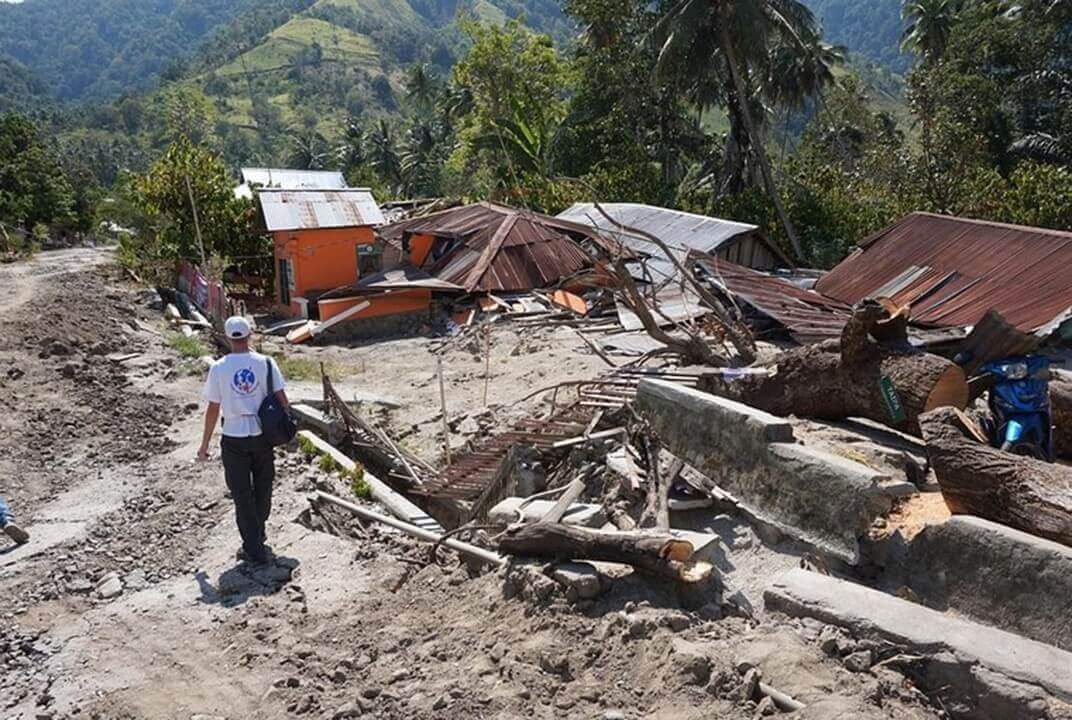BRIDGING THE DIGITAL DIVIDE
The UK Space Agency’s International Partnership Programme (IPP) offers governments and organisations in emerging and developing economies around the world the chance to work with UK satellite experts on projects aligned with the UN’s SDGs – the blueprint for a sustainable future for all.
In 2017-19 Inmarsat was awarded IPP funding to lead three projects using satellite technology to improve and protect people’s lives in Nigeria, Indonesia and the Philippines. In each of the projects – covering rural healthcare, sustainable fishing and disaster response – detailed monitoring and evaluation demonstrated the positive impact and the cost effectiveness of satellite communications. The Inmarsat solutions developed for the programmes continue to be used in the target communities.
In Nigeria, Inmarsat worked with InStrat, Africa’s leading mobile health solutions provider, the Nuffield Centre for International Health and Development, and federal and state health ministries on a project aimed at raising the standard of healthcare outcomes in areas with unreliable or non-existent terrestrial communication networks.
Poor infrastructure and isolated rural communities mean many people in Nigeria have little or no access to regular medical care and advice. Eighty four health clinics in Kano and Ondo states and the Federal Capital Territory (FCT) which have no 3G coverage were supplied with Inmarsat BGAN broadband data terminals to:
- Provide video-based health worker training
- Improve health systems management and governance using an information system
application - Improve disease monitoring
The project succeeded in improving maternal and child healthcare provision, with health worker skill levels improved and patients more satisfied with the service they received. Demand for and use of medical data by ministries of health to inform policy grew, and disease reporting rates in the project areas rose from 20% to 65%, with the speed and accuracy of data analysis significantly increased.
Examples of remote video training in action included the resuscitation of a newborn baby and saving the life of a woman in childbirth. The resources also contributed to education programmes, such as the benefits of breastfeeding.
The project was designed to create a model that can be extended into other parts of Nigeria, strengthening the country’s healthcare system – a move that is backed by all the state ministries involved.
In Indonesia, Inmarsat, a consortium of UK partners and local service provider SISFO worked with the Indonesian Ministry of Marine Affairs and Fisheries (MMAF) to help reduce illegal fishing and improve safety and livelihood security for the seven-million strong fishing community.
Environmentally unsustainable fishing – including illegal and unreported catches – is having huge ecological and financial consequences in the country, impacting on the entire value chain and costing the government around $3 billion a year. The project aimed to incentivise fishermen to adopt satellite-based Vessel Monitoring Systems (VMS) by building in data services to enhance their safety, productivity and food security, using Inmarsat’s IsatData Pro machine-to- machine (M2M) technology. It was also designed to help inform the MMAF on the shape of future fishery regulation.
The VMS+ satellite system, installed on 200 small vessels, had a clear impact on safety. The crew on four boats in distress at sea were rescued after using the SMS text function. Fishers were able to improve their business operations by locating the best fishing grounds, filling up with their catch quicker and reducing the length of trips. Profits rose by 12% and crew retention rates were much better.
Results also supported the case for requiring vessels less than 30 GT to have VMS onboard to help combat IUU – as well as to potentially improve access to international markets, although this will require new regulation and assistance for small-scale fishers to acquire equipment.
The Philippines project aimed to reduce the impact of natural disasters in a nation that suffers over 20 cyclones annually, as well as frequent volcanic eruptions and earthquakes. While experienced at responding to sudden natural disasters, resource constraints, infrastructure fragility and geography means that the human and economic cost remains high.
Inmarsat and a consortium of partners including Satellite Applications Catapult and Télécoms Sans Frontires (TSF) worked with the Philippine government to transform disaster response.
Prepositioning powerful but easily deployable equipment – Global Xpress and BGAN broadband data terminals and IsatPhone 2 satellite phones – in five pilot regions meant reliable, secure communications were ready in place in the event of a disaster to help relief agencies and first responders send and receive information much more effectively, and enable the government to restore communications and increase command and control of recovery operations within 24 hours. Regional staff were trained how to use all the satellite equipment.
During the project period, the satellite equipment was deployed in eight typhoons and in the evacuation of tens of thousands of people during the eruption of Mt Mayon in January 2018. Results showed faster and better co-ordinated responses in the immediate aftermath, as well as improved conditions in the longer term in Mt Mayon evacuation centres with access to a BGAN terminal.

